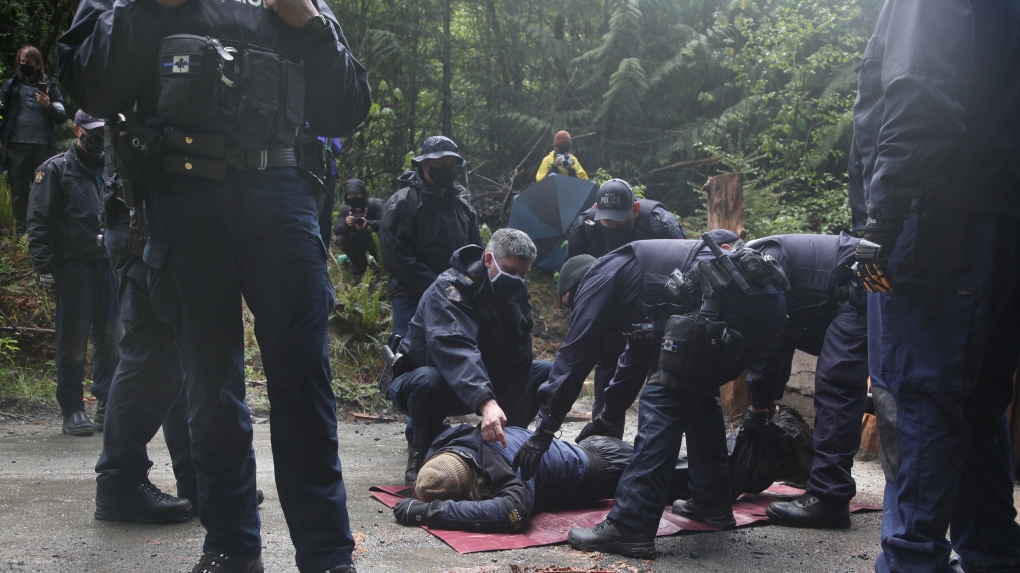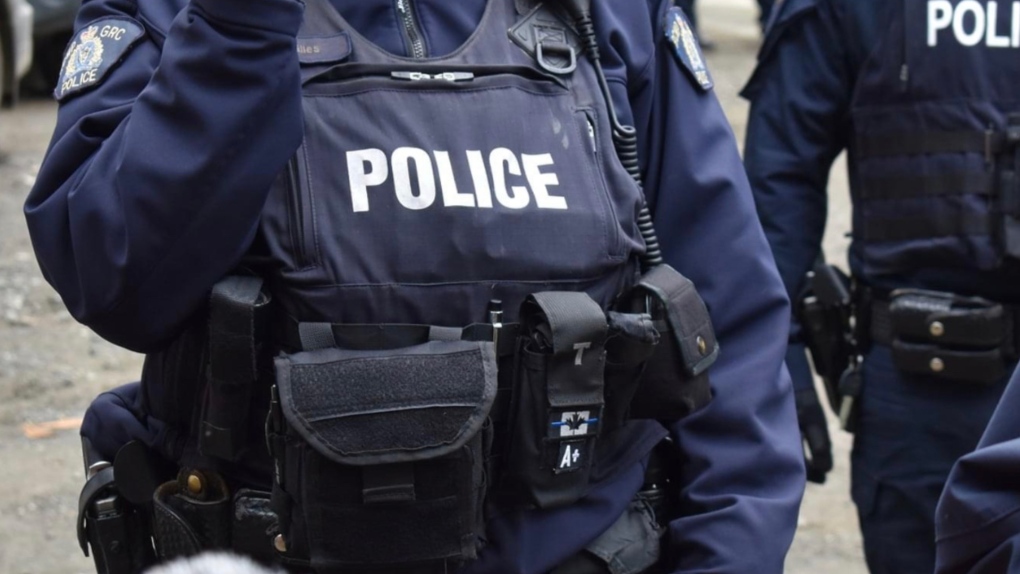Mounties criticized for wearing 'thin blue line' patches at B.C. old-growth logging protests
Some RCMP officers who are enforcing a British Columbia court injunction to remove old-growth logging blockades on Vancouver Island are wearing the controversial "thin blue line" patch on their uniforms, despite an official RCMP directive against the insignia.
RCMP headquarters told the Mounties in October they could no longer display the patch depicting a black and grey Canadian flag with blue stripe through it while on duty.
The directive opened a rift between RCMP brass and the National Police Federation, the union representing nearly 20,000 RCMP officers.
The union rejected the directive and said it would supply the patches to all its frontline members and "assist in defending any member who faces disciplinary action" for wearing it.
Some metropolitan police forces in Canada, including Ottawa and Victoria, have since banned the insignia, while others, including Montreal, have said they are reviewing its use.
The patch "delineates the important and often dangerous role police officers play in providing a barrier between social order and chaos," the National Police Federation said in a statement on Oct. 12.
But others, including a researcher who studies policing at the University of Victoria, say the patch fuels tensions between police and protesters by reinforcing an us-against-them mindset, and politicizes the role of law enforcement.
 RCMP officers, including two wearing the 'Thin Blue Line' patch, arrest a man during an anti-logging protest in Caycuse, B.C. on Tuesday, May 18, 2021. THE CANADIAN PRESS/Jen Osborne
RCMP officers, including two wearing the 'Thin Blue Line' patch, arrest a man during an anti-logging protest in Caycuse, B.C. on Tuesday, May 18, 2021. THE CANADIAN PRESS/Jen Osborne
RCMP officers, including two wearing the 'thin blue line' patch, arrest a man during an anti-logging protest in Caycuse, B.C. on Tuesday, May 18, 2021. THE CANADIAN PRESS/Jen Osborne
British Columbia RCMP spokesperson Sgt. Chris Manseau said this week that the RCMP commanders who are enforcing the injunction on southwestern Vancouver Island have been reminded of the official directive against wearing the logo.
"We respect that the RCMP has issued guidance regarding the patch and we also understand the position of the RCMP union on this matter," Manseau said Thursday.
The National Police Federation and the RCMP’s national headquarters both declined to comment publicly on the issue this week.
'It’s an inappropriate response'
Blockade organizer Kathy Code says that by displaying the patch at the injunction site, the RCMP are casting protesters as the enemies of civil society rather than peaceful demonstrators.
"It’s an inappropriate response," says Code, who helped establish the legal defence team for the Rainforest Flying Squad protest group.
"I would point out to them that we are acting on behalf of everyone here," adds Code, who says she has seen the patches on multiple RCMP officers at the injunction site since the beginning of the enforcement in May and as recently as Thursday.
"When we come to save the trees, we’re saving the trees for everyone and all of the generations to come, including the families of RCMP officers," Code adds.
 An RCMP officer wears a 'Thin Blue Line' patch while enforcing a court injunction against old-growth logging protesters on Vancouver Island. (Torrance Coste)
An RCMP officer wears a 'Thin Blue Line' patch while enforcing a court injunction against old-growth logging protesters on Vancouver Island. (Torrance Coste)
An RCMP officer wears a 'thin blue line' patch while enforcing a court injunction against old-growth logging protesters on Vancouver Island on May 26, 2021. (Torrance Coste)
Political scientist Michelle Bonner says wearing the patch at the Vancouver Island blockades is counterproductive to peaceful conflict resolution.
"There’s an inherent tension in the policing of protests," says Bonner, whose research at the University of Victoria specializes in the policing of protests. "And to re-emphasize that tension with a patch that says 'We are here to maintain order and you are part of the chaos we are defending against' creates division."
Bonner, who has authored four books on democracy and policing, says the addition of the thin blue line patch to police uniforms undermines the perceived neutrality of a police force that is meant to protect all citizens.
"It’s very important that their presentation appears to be politically neutral and a lot of thought has gone into the symbolism around police, including their uniforms," Bonner says. "It’s very important for police legitimacy and it’s very important for state legitimacy."
'Who is civil society and who is chaos?'
The UVic professor says protests, such as those against old-growth logging in B.C., "are an act of last resort when people feel there is no other channel left" outside of civil disobedience.
"So who is civil society and who is chaos? Oftentimes those who are chaos are marginalized people and in this case also protesters," Bonner says. "If the police are the only group in society that can defend us against chaos, it echoes authoritarianism, which believes that force is the only way to maintain order."
More than 165 people have been arrested since May 17 at the blockades aimed at preventing the logging of old-growth forests.
The court injunction was granted in April to allow forestry workers with the Teal-Jones Group to log the area near Port Renfrew, B.C.
Activists say the area is among the last intact old-growth watersheds on Vancouver Island. Teal-Jones has said it plans to harvest 20 hectares of the 1,200-hectare watershed.
CTVNews.ca Top Stories

Second Cup closes Montreal franchise over hateful incident
Second Cup Café has closed one of its franchise locations in Montreal following allegations of hateful remarks and gestures made by the franchisee in a video that was widely circulated online during a pro-Palestinian protest on Thursday.
Winnipeg police shoot, kill suspect after officer stabbed in the throat
A Winnipeg Police Service officer is recovering after he was stabbed in the throat Sunday evening.
Court hearing legal arguments in sex assault case of five hockey players
A London, Ont., judge is set to hear legal arguments today in the sexual assault case of five members of Canada's 2018 world junior hockey team.
Cargo ship runs aground in St. Lawrence River near Morrisburg, Ont.
A large cargo ship remains stuck in the St. Lawrence River after running aground on Saturday afternoon.
'It’s pretty emotional': N.B. family escape fire, plan to rebuild home
A family in Riverview, N.B., is making plans for Christmas and the future after escaping a fire in their home on Nov. 14.
Should sex abuse evidence set the Menendez brothers free? A judge will decide
A judge will decide Monday whether new evidence warrants a re-examination of the convictions of Erik and Lyle Menendez in the shotgun murders of their parents in their Beverly Hills home more than 30 years ago.
Dozens of people in Canada have scurvy, and it's because of food
A disease often thought to only affect 18th century sailors is reemerging in Canada.
B.C. man awarded $800K in damages after being injured by defective bear banger
A B.C. man has been awarded nearly $800,000 in damages as compensation for injuries he sustained from a defective bear banger, according to a recent court decision.
Prosecutors demand maximum sentence for Gisele Pelicot's ex-husband in mammoth rape trial in France
A mammoth rape trial in France moved into a new phase Monday with prosecutors beginning to lay out the verdicts and punishments they want for dozens of men accused of raping Gisele Pelicot while she was drugged and rendered unconscious by her husband.


































